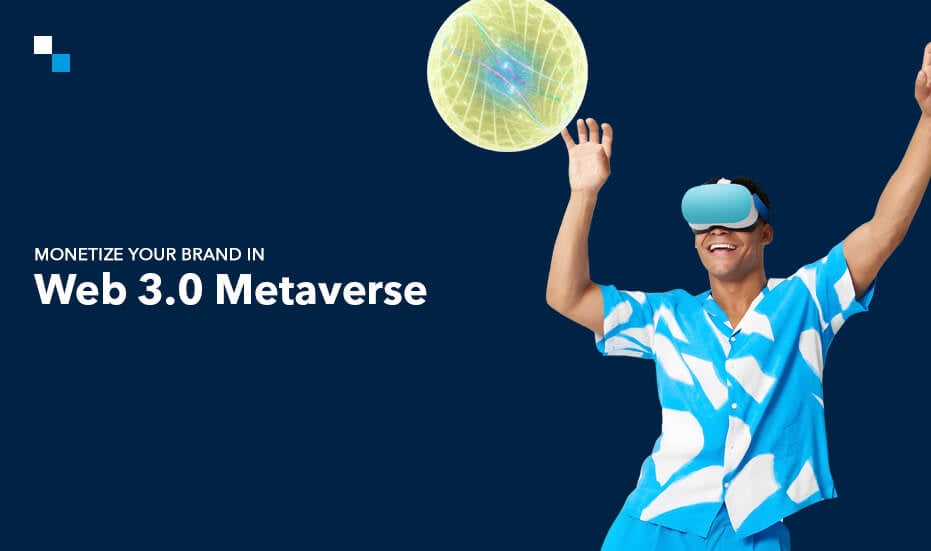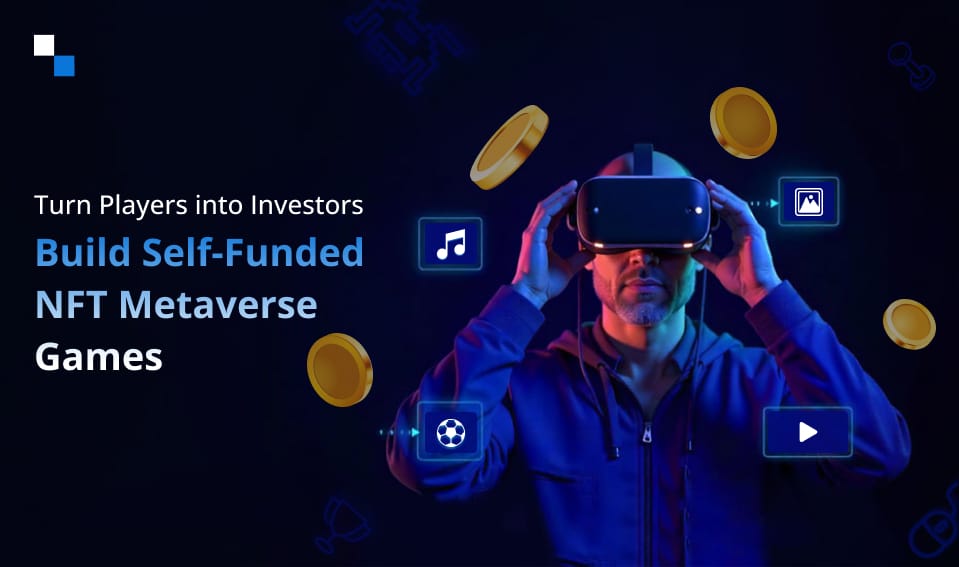
A Step-by-Step Guide to Creating dApps on TON Blockchain in 2024
October 3, 2024
Top 5 Telegram Tap to Earn Bot Games of 2024
October 4, 2024Web 3.0 Metaverse shares an intertwined vision, changing how businesses engage with customers, interact socially, and transact in the virtual world. This transition from static platforms to an interconnected immersive world unlocks new business opportunities across industries including real estate, Healthcare, Manufacturing, Education, and more.
While web3 puts the control of content, assets, and facilities back in the user’s hand, without intermediaries, Metaverse is merging the real and virtual worlds for realistic and immersive experiences without geographical constraints.
This guide will help you understand that Web 3.0 Metaverse harmoniously works together to shape the future of the digital economy.
Understanding Web 3.0 Metaverse: What is the connection between the two?
Web3 is the third generation of the internet- decentralized in nature, and Metaverse is the extension of the internet into a VR-based parallel world, enabling user interactions in digital objects in an immersive 3D environment.
In the Metaverse, people represent themselves using 3D avatars, allowing them to run everyday errands virtually in real time. Web3 enhances this experience by creating a decentralized space for secure digital transactions and identity management through dApps and smart contracts.
The Web 3.0 Metaverse Platform creates a more immersive and secure online environment where users can interact and transact seamlessly.
Utility NFTs: Building Strong Digital Economy in the Web 3.0 Metaverse
Businesses aiming to unlock higher engagement and ROI must invest in Utility NFTs. Utility NFTs are unique digital tokens that provide the holder with specific rights or access within the metaverse.
These digital assets not only represent ownership but also provide practical applications that can redefine customer interactions and create new revenue streams. Unlike traditional NFTs, which are solely focused on collectibles or art, utility NFTs serve functional purposes, such as:
1. Driving Customer Engagement and Loyalty
Utility tokens can serve as access keys to exclusive content, virtual events, or special product launches, sharing immersive user experiences.
By offering unique incentives tied to these NFTs businesses can convert passive consumers into active participants, promoting brand loyalty and community engagement.
2. Innovative Revenue Models
The integration of utility NFTs allows businesses to explore new revenue models that were previously unattainable.
For example: fashion brands can use virtual clothing as utility NFTs that can be worn by avatars in metaverse environments. This not only expands their product offerings but also taps into the growing market for digital fashion.
Additionally, utility NFTs enable fractional ownership of digital assets or virtual real estate, democratizing access and allowing more users to invest without significant financial barriers.
3. Enhancing Authenticity and Trust
In industries such as luxury goods, utility NFTs play a crucial role in establishing authenticity and combating counterfeiting. By embedding unique identifiers within each NFT, brands can assure customers of the legitimacy of their products.
This transparency not only builds consumer trust but also strengthens brand reputation in an increasingly competitive marketplace.
Emerging Trends In Web 3.0 Metaverse: Nudging Businesses into the Future
1. Decentralization In Metaverse: Empowering Users
Moving from centralization to decentralization within Metaverse is offering businesses and customers more control over their data and interactions. Brands like Gucci and Nike are already making a shift by integrating Web3 elements in their Metaverse for improved customer experiences and engagement with products/services.
2. Generative AI: Personalization at Scale
Web3 Applications are now using Generative AI for personalized content creation, complimenting enhanced user experiences. This integration streamlines processes like smart contract execution and transaction verification, creating new digital assets and experiences for the users. With generative AI, businesses create even more immersive environments aligned to the preferences of the users.
3. Brand As-a Service: Redefining Brand Engagement
BaaS is yet another emerging trend enabling businesses to harness Web3 to create a unique brand experience within Metaverse. This service model encourages the development of virtual storefronts to increase brand loyalty and improve customer interactions. It also contributes to saving resources that are usually invested in infrastructure development.
4. Regenerative Finance: Promoting Sustainability
DeFi in Web 3.0 Metaverse contributes to democratizing access to financial services while promoting sustainability. Businesses focused on combating climate change and environmental degradation are gaining momentum, indicating a growing trend towards socially responsible investments within the Web3 ecosystem.

What Kind Of Businesses Are Monetizing In We3 Metaverse?
1. Gaming and Entertainment
The Gaming Industry is leading its charge into the Metaverse. Decentralized games are giving ownership rights to players on their in-game assets. And, without the involvement of intermediaries, players are freely trading their in-game assets across Metaverse gaming platforms, creating more vibranet communities and encouraging fair completing.
For businesses in game development, investing in Web 3.0 Metaverse could be digging goldmine for higher revenue, more engagement, and better innovation.
2. Real Estate
While Metaverse enables potential buyers to experience properties right from their couch and see renovations and design spaces in real time, Web3 is making online transactions entirely transparent and secure.
3. Education and Training
Web 3.0 Metaverse brings education and training together in an entirely immersive environment where learners can explore, experience, and understand new concepts while virtually walking through digital libraries that feel real.
Not just the education institutes, corporate training can also be provided in
The Web 3 Metaverse development services are helping businesses to save dollars with no diminution of the learning experience.
4. Retail Industry
The Web 3.0 Metaverse is turning shopping into an unforgettable experience. Virtual stores enable customers to see the product in an interactive setting and then buy the product with cryptocurrency.
While it makes shopping exciting for a customer, it is to create new revenue streams for the retailer. Web3 Measverse gives Retail businesses a chance to engage customers in a completely new way!
5. Healthcare Sector
Now virtual consultations and treatments are at the fingertips. Patients can receive medical care without stepping outside the place, which can bridge gaps for those in remote areas.
In Web3, healthcare providers can promise true blue trustworthy services with data security. For healthcare businesses, Web 3.0 Metaverse is just not useful; that’s essential!
Strategic Questions for Businesses
To successfully navigate the Web 3.0 Metaverse brand leaders should consider several strategic questions:
- What Unique Value Can We Offer? Identify how Web 3.0 Metaverse aligns with your brand’s identity and consumer expectations.
- How Do We Measure Success? Establish metrics for evaluating engagement and ROI from metaverse initiatives.
- What Are Our Long-Term Goals? Consider how participation in the Web 3.0 Metaverse fits into broader business objectives and innovation strategies.

Tangible Applications of in the Web 3.0 Metaverse
- Businesses can leverage Web 3.0 Metaverse to create immersive marketing campaigns that resonate with consumers. For example, virtual fashion shows or interactive product launches can drive engagement and brand loyalty.
- The integration of physical and digital experiences can help businesses to enhance customer interactions. For example, customers can explore products virtually before making a purchase in-store, creating a seamless shopping experience. This hybrid approach not only enriches customer engagement but also drives traffic to physical locations.
- Businesses can use the Web 3.0 Metaverse for remote team-building activities, training sessions, and collaborative projects. As younger generations become more comfortable in virtual environments, businesses can attract talent by offering engaging work experiences that align with their preferences. This will reduce travel costs and foster a sense of community among remote teams.
- The Web 3.0 Metaverse enables immersive learning environments where students can explore concepts interactively. This approach enhances understanding and retention while providing cost-effective training solutions for businesses.
Thrive in the Web 3.0 Metaverse: Maximize Your ROI Today!
Unlock the potential of the Web 3.0 Metaverse and boost your returns! Choose Antier as your premier Metaverse Development company to create powerful immersive solutions that drive decentralized finance.
At Antier, we are pioneers in Metaverse development. Our skilled team of Web3 specialists—developers, marketers, and business strategists—understands what it takes to succeed in this vibrant market.
Here’s How Antier Can Help You Shine:
- Create Decentralized Apps: Build applications that work across multiple Metaverse platforms for seamless user experiences.
- Custom Metaverse Solutions: Transition your business into the Web3 world with tailored strategies designed just for you.
- Build Digital Economies: Set up immersive spaces with 3D avatars and engage users in dynamic interactions.
- Strategic Marketing: Develop targeted marketing strategies, including community building and influencer partnerships, specifically for the Web3 landscape.
- Blockchain Expertise: Get actionable advice on using blockchain technology to achieve your goals and unlock new revenue streams.
Don’t let this opportunity pass you by. Partner with Antier today and transform your business in the Web 3.0 Metaverse!



